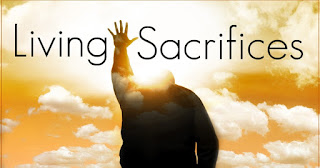Theft
Read Mark 11:1-26.
"My house," Jesus said, "will be called a house of prayer for all nations. But you have made it a den of robbers." (Mark 11:17).
Often, I hear people quote this passage when they don't think people should be selling things in the church building. At one of my appointments, I had a man who wouldn't even eat a meal in the fellowship hall if it was a fundraiser because of this verse. After all, Jesus says, these merchants were thieves and robbers, setting up in the Temple court. We should make sure we are not thieves as well.
And I agree—with the principle, but not with the premise. I'm not sure Jesus is talking about economic thievery here, or that he's all that concerned about the price people were charging for the doves or other animals being sold for the sacrifice. I've become less convinced of the traditional understanding of this verse as I've pondered what he says before and come to understand where it is he says it.
The "where" is in the outer courts of the Temple. In the Temple courts, there were varying levels of approach. Who you were (or, really, what kind of person you were) determined how close to the actual Temple building you could get. The closest court was set aside for the Israelite men—sons of the covenant. The next outer court was the Court of the Women, where Hebrew women could come to worship. (A similar division exists still today at the Wailing or Western Wall in Jerusalem—men on one side, women on the other, smaller, side.) The furthest court away from the Temple building itself is the Court of the Gentiles—the place where non-Jews who wanted to worship God could come. They weren't physically close, but at least they were in the area.
The Court of the Gentiles, scholars seem to all agree, is where the marketplace was set up. Oftentimes it was across the valley on the Mount of Olives, but for high festivals (i.e., lots of tourists) it was moved to the Court of the Gentiles, where lots of people would pass by and through. They certainly couldn't put it in either of the other two courts—that would disrupt the real "business" of the Temple. So they would take over the Court of the Gentiles and deny non-Jews a place to pray.
That's really what they have stolen here, because that's what Jesus focuses on. He doesn't begin by chastising them for the money they are making. He chastises them for turning a place of prayer into a place of profit. "My house will be a house of prayer!" Jesus declares. Jesus isn't clearing the Temple so much of a marketplace as he is making a place of prayer—and nothing will stand in his way.
The message for us? Be careful not to rob someone else of prayer, of their place of prayer. Prayer is the language of the kingdom, the vital practice where kingdom business happens. Maybe, in our distracted age, Jesus might even come to our homes and clear out our schedules, our social media, our television and other entertainments—the things that keep us from prayer—and call us to bend the knee, to not allow those things to get in the way of the most important transaction we have to do. "My house will be a house of prayer."




Love the comic and it does make sense that this is what Jesus was talking about.
ReplyDelete